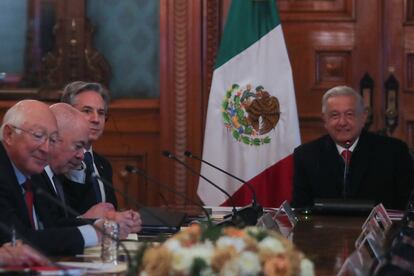The United States and Mexico agree to strengthen their efforts to ‘disrupt’ criminal migrant networks
The diplomatic delegations agreed on the need to keep the border open for trade


On Wednesday, the meeting between President Andrés Manuel López Obrador and Secretary of State Antony Blinken resulted in several agreements: “Ongoing cooperation also includes enhanced efforts to disrupt human smuggling, trafficking, and criminal networks, and continuing the work to promote legal instead of irregular migration pathways.” Delegations of diplomatic and security officials from the two countries met in Mexico to try to stop the “unprecedented” arrival of migrants at the U.S. border, people who have been driven to take a brutal journey with their families by the violence, political repression and poverty in much of Latin America. The joint statement issued by the two countries does not specify ways to stop the coyotes who traffic migrants, an enterprise that has recently become a major business for criminal organizations.
The surge in migration in the final months of 2023, in which thousands of people crowd the banks of the Rio Bravo on a daily basis, kept several border crossings closed last week. The closures led Mexican businesspeople to complain about millions of dollars in losses. The cordial and friendly meeting between the two countries addressed this issue and concluded with a U.S. promise that these trade routes will remain open in the future. The joint statement says that they are focused on “promoting orderly, humane and regular migration,” which includes tackling the source of these mass exoduses through cooperation with Central American countries. The press release specifically mentioned “the joint initiative for Cubans, Haitians, Nicaraguans and Venezuelans,” in line with the agreement at the recent summit in Palenque, where, at Mexico’s invitation, these nations’ leaders met to address the causes of migration and possible solutions.
In the middle of winter, hundreds of thousands of migrants continue to cross Central American countries to complete their journey to the border through Mexico, an extremely dangerous and corrupt journey for these people.
President López Obrador called for continued diplomatic engagement with the region’s countries, “as well as investing in ambitious development programs throughout the entire hemisphere of the Americas.” Both delegations emphasized the White House’s willingness to implement humanitarian and development aid, as well as to encourage “new private investments in the region.”
The officials also discussed “the benefit of regularizing the situation of long-term undocumented Hispanic migrants and DACA recipients, who are a vital part of the U.S. economy and society.”
The Mexican president’s good relations with his northern neighbor will be channeled into new periodic meetings, the next of which will occur in January of next year. This latest bilateral meeting, to which Blinken was accompanied by the Secretary of Homeland Security, Alejandro Mayorkas, and the White House National Security Advisor, Elizabeth Sherwood-Randall, was preceded by Secretary of the Treasury Janet Yellen’s visit last December 5. Yellen met with her counterparts in Mexico to discuss financial and economic measures to stifle criminal financing and money laundering channels. The three major problems that strain U.S.-Mexico relations the most are the trafficking of fentanyl, arms smuggling, and the trafficking and extortion of migrants.
This morning, López Obrador said that Joe Biden is the only recent U.S. president, Democrat or Republican, who has not emphasized the need to build walls at the border. The Mexican president celebrated Biden’s approach by praising him and once again emphasizing the good relationship between the two countries, as evidenced by the warm welcome Mexico extended to the U.S. delegation yesterday.
Both nations’ economies are inevitably interconnected by strong economic ties, despite the political upheavals that the presence of migrants on the border causes; that is especially true in the United States, where Republicans often use the issue to hurt Democrats politically.
But the truth is that neither the wall nor the implementation of restrictive measures during the coldest moments between the two administrations have managed to stop the enormous stream of people fleeing from misery in their own countries. On the contrary, the precarious economies and political situations of countries like Venezuela, Guatemala, Honduras and Nicaragua have recently pushed hundreds of thousands of fellow countrymen out of their nations. The subsequent punishing journey has not dissuaded these migrants from leaving.
Recently, a new caravan of thousands of migrants is heading from the south of Mexico to the north with the intent of crossing into the United States. However, in Texas, for example, Republican governor Greg Abbott has enacted drastic measures to curb the presence of migrants, including deportation if they are found to lack documentation. The hardline governor is also sending busloads of migrants all the way to New York and Washington in protest of Biden’s immigration policies.
Sign up for our weekly newsletter to get more English-language news coverage from EL PAÍS USA Edition
Tu suscripción se está usando en otro dispositivo
¿Quieres añadir otro usuario a tu suscripción?
Si continúas leyendo en este dispositivo, no se podrá leer en el otro.
FlechaTu suscripción se está usando en otro dispositivo y solo puedes acceder a EL PAÍS desde un dispositivo a la vez.
Si quieres compartir tu cuenta, cambia tu suscripción a la modalidad Premium, así podrás añadir otro usuario. Cada uno accederá con su propia cuenta de email, lo que os permitirá personalizar vuestra experiencia en EL PAÍS.
¿Tienes una suscripción de empresa? Accede aquí para contratar más cuentas.
En el caso de no saber quién está usando tu cuenta, te recomendamos cambiar tu contraseña aquí.
Si decides continuar compartiendo tu cuenta, este mensaje se mostrará en tu dispositivo y en el de la otra persona que está usando tu cuenta de forma indefinida, afectando a tu experiencia de lectura. Puedes consultar aquí los términos y condiciones de la suscripción digital.








































